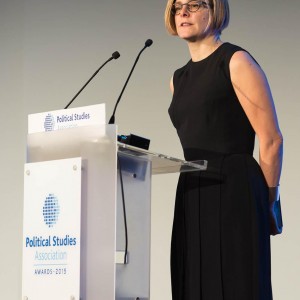Sarah Childs, Ph.D.
sarah.childs@rhul.ac.uk
Full Professor
Royal Holloway, University of London

Year of PhD: 2000
Phone: 07950933371
Address: Royal Holloway, University of London
City: Egham, England
Country: United Kingdom
About Me:
Sarah Childs is Professor of Politics & Gender at Royal Holloway, University of London in May 2020. Previously she was Professor of Politics & Gender at Birkbeck College, University of London (2017-2020), and the University of Bristol (2009-2014; lecturer and SL 2003-2009). Sarah’s research centres on the theory and practice of women’s representation, gender and political parties, parliaments and institutional change. Key articles have been published in Political Studies, Politics and Gender, Parliamentary Affairs and Party Politics. In 2020, and writing with Karen Celis (VUB), Sarah will publish with Feminist Democratic Representation (Oxford University Press, US). Other books include: New Labour’s Women MPs, 2004; Women and British Party Politics, 2008); Sex Gender and the Conservative Party, with Paul Webb, 2012 and based on three-year ESRC grant; Gender, Conservatism and Representation, and Deeds and Words, 2015, edited with Celis and Campbell respectively, both by ECPR press. For 2020-21 she has been awarded a Leverhulme Research Fellowship to write a monograph, Building Feminist Institutions, based on her experiences re-gendering the UK House of Commons. In 2015 Sarah received the UK Political Studies Association ‘Special Recognition Award’.Sarah Childs is an impactful academic: In 2009-10 she was the gender Special Adviser to the UK Parliament’s ‘Speaker’s Conference’ on representation and in 2014 the Special Adviser to the All Party Parliamentary Group, Women in Parliament Inquiry. Following a secondment to the House of Commons in 2015-2016 funded by the ESRC, Sarah published The Good Parliament (TGP) Report which identified a series of reforms to make the UK House of Commons diversity sensitive. On her recommendation a new group of MPs, The Commons Reference Group on Representation and Inclusion was established by Mr Speaker. In the years since publication of TGP, some 18 recommendations have been adopted; most notably in 2019, the introduction of proxy voting for MPs on ‘babyleave’. Having advised the Reference group during 2016-18, in 2019 Sarah advised the Women and Equalities Committee's inquiry into the UK Gender Sensitive Parliament Audit.
Research Interests
Legislative Politics
Political Participation
Representation and Electoral Systems
Women's Political Representation
UK Parliament
Gender And Democracy
Countries of Interest
United Kingdom
My Research:
For 2020-21 she has been awarded a Leverhulme Research Fellowship to write a monograph, Building Feminist Institutions, based on her experiences re-gendering the UK House of Commons. This work reflects on the The Good Parliament Report, a blueprint for a diversity sensitive Commons.
Publications:
Books Written:
Hardly anywhere are women equally presented in our elected political institutions; women’s political issues and interests are all too often marginal to mainstream debate. Women’s poverty of representation will not be solved by adding a few more women to our parliaments, legislatures and assemblies. We need the formal institutions of representative democracy – and all its politicians, men and women - to work and do better for women. Democratic decision makers should know more and care more about the political needs of women. Our political institutions and political actors need to connect with women in society, much, much better than now is the case. How do we get there? This is the essential question that frames this FB page. Feminist Democratic Representation (FDR) is our answer. This is about changing the processes and practices of politics. We need to re-design our democratic institutions and change how politics happens within it, and how it works with and responds to women outside. If gender quota in politics was the first-generation means by which it was said politics would work better for women, FDR is the second-generation means. FDR creates a new process of representation, brings about new representative relationships between elected representatives and women. It takes seriously differences amongst women: women’s ideological and intersectional diversity, and reflects much better how political representation works on the ground. For us, representation is not just about standing for and acting for women, it is also about how women feel about politics.
Based on a three year, ESRC funded research project, and co-authored with Paul Webb, this book evaluates the feminisation of the UK Conservative party.
Analysis of women's representation
Analysis of women's representation and the new Labour women of 1997; interviewed in 1997 and 2000.
Media Appearances:
Radio Appearances:
General Election special
BBC woman's hour: centenary of women's suffrage in the UK
Interviewed by Matt Forde